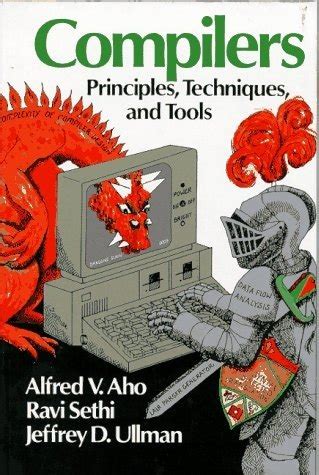
Instructor: Christino Tamon
Class: TR 3:00-4:15 (SC342)
Office hours: TR 9:15-11:00, 2-3 (SC373)
A study of compiler design. Overview of the compilation process. Formal definition of syntax, lexical scanning, parsing including LL and LR grammars, run-time structures, intermediate code generation, and storage allocation. The goal is to develop a compiler for a high-level programming language using standard compiler tools.
Grading:

The following texts are also highly recommended:
Objective: to understand the fundamentals of compiler theory and its application in constructing a real working compiler.
Specific outcomes:
Although attendance is not mandatory, students are responsible for all course materials covered in lectures and any exams given during class periods. Students that need to make up missing course work must provide the required Clarkson official exempt form. All students must submit their own work; the exchange of ideas are encouraged but ultimately the submitted work must be the student's own. Please refer to the Clarkson University Regulations for more guidelines on academic integrity and related matters.
All chapter references are for the Dragon book (1986 edition).
Little Dragon projectAppendix A: Compiler Dragon project [Dragon One]
Thompson construction (RE to NFA), Subset construction (NFA to DFA), shortcut construction (RE to DFA),
two-stack simulation of NFA, DFA minimization algorithm (half of Myhill-Nerode theorem),
Knuth-Morris-Pratt algorithm, Aho-Corasick algorithm.
| Tuesday | Thursday |
|---|---|
| Jan 10
| Jan 12 Chapter 1: compilation (what-why-how). |
| Jan 17 Chapter 2: calculator Lexical analysis (scanner): regular languages, regular expressions (recap of CS345). | Jan 19 Chapter 2: calculator Syntax-directed translation. |
| Jan 24 No (power) class. | Jan 26 Chapter 2: calculator (parsing) Context-free grammars (recap of CS345). |
| Jan 31 Chapter 2: calculator (recursive descent parsing) Context-free grammar: ambiguity, left-recursion, left-factoring. | Feb 2 Chapter 2: calculator (semantics) Delayed semantics: intermediate representation (syntax trees). |
| Feb 7 Enter the Dragon: grammar. Chapter 9: "tree-walking" gencode (Section 9.10). | Feb 9 Compiler tools: lex and yacc. To-do: checklist. |
| Feb 14 Code Generation. Reading: Section 9.10. | Feb 16 RegExp2DFA: no NFA, no cry. Reading: Chapter 3 (section 3.9). |
| Feb 21 RegExp2DFA, DFA minimization. Reading: Chapter 3 (section 3.9). | Feb 23 Short break. |
| Feb 28 String matching Knuth-Morris-Pratt. Failure function. | Mar 2 Pattern matching on tries Aho-Corasick: pdf. Reading: Chapter 3, Exercises 3.31-3.32. |
| Mar 7 More on Aho-Corasick. Exercises: sample. | Mar 9 Test 1 (sol). |
| Mar 14 Spring break. | Mar 16 Spring break. |
| Mar 21 Symbol table. Reading: Chapter 7. Hash tables (hashpjw). | Mar 23 Semantic analysis. Type checking. Reading: Chapters 5,6. Testing: /afs/cu/class/cs445/public/s23/Semantic-Testing. |
| Mar 28 Dragon coding session. | Mar 30 |
| Apr 4 Dragon coding session. | Apr 6 Top-down LL(1) parsing. Reading: Chapter 4.1-4.4. |
| Apr 11 Bottom-up SLR(1) parsing. Reading: Chapter 4.5-4.7. Exercises: sample. | Apr 13 Runtime environments. Reading: Chapter 7,9.10. |
| Apr 18 Intel assembly. Reading: Chapter 7,9.10. | Apr 20 Test 2 (sol). |
| Apr 25 Code generation. | Apr 27 Code generation. |

(1.0) Lexical Analysis
(1.5) Syntax Analysis: grammar adjustments
(2.0) Symbol Table
(2.5) Syntax Tree (Intermediate Code Generation)
(3.0) Semantic Analysis & Type Checking
(4.0) Code Generation